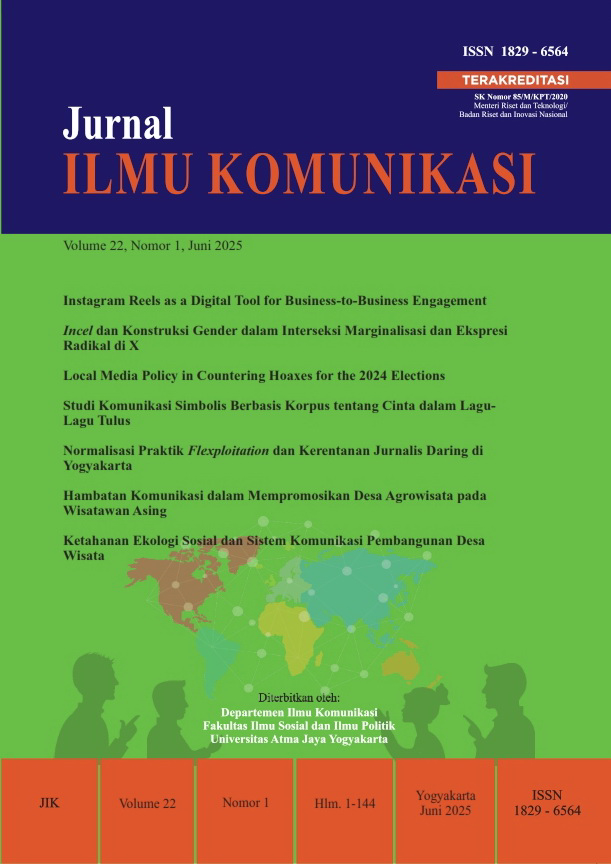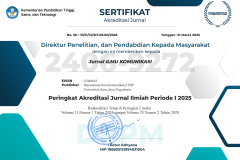Ketahanan Ekologi Sosial dan Sistem Komunikasi Pembangunan Desa Wisata
DOI:
https://doi.org/10.24002/jik.v22i1.9885Keywords:
community-based tourism, development communication, rural tourism, social systemAbstract
This study examines the socio-ecological crisis in Wanurejo Village following its transformation into a tourism destination. From a constructivist perspective and using Luhmann’s social system theory, it explores the causes of the crisis and the formation of a Community-Based Tourism (CBT) communication system. Findings reveal that environmental degradation stems from farmers’ vulnerability and tourism complexity. Effective CBT development requires inclusive participation, fair income distribution, and alignment with the Borobudur image. The study concludes that balancing tourism growth with environmental and social justice is essential, and an inclusive communication system can enhance community involvement and reduce the adverse impacts of tourism.
References
Cole, S & Browne, M. (2015). Tourism and water inequity in Bali: A social-ecological systems analysis. Human Ecology, 43(3), 439–450.
Djatmiko, A., Syarifuddin, D., Raharja, A. B., & Fitriani, S. A. (2021). Assessment of local communities capacities on developing ethnographic tourism of Kampung Naga, West Java, Indonesia. IOP Conference Series: Earth and Environmental Science, 737(1), 1-8.
Dolezal, C., & Novelli, M. (2020). Power in community-based tourism: Empowerment and partnership in Bali. Journal of Sustainable Tourism, 0(0), 1–19.
Espeso-Molinero, P., & Pastor-Alfonso, M. J. (2020). Governance, community resilience, and indigenous tourism in Nahá, Mexico. Sustainability, 12(15), 1-20.
Ghaderi, Z., Hall, M. M. C., & Ryan, C. (2022). Overtourism, residents and Iranian rural villages: Voices from a developing country. Journal of Outdoor Recreation and Tourism, 37(15), 1-12.
Ikhtiagung, G. N., & Radyanto, M. R. (2020). New model for development of tourism based on sustainable development. IOP Conference Series: Earth and Environmental Science, 448(1).
Kunjuraman, V. (2020). Community-based ecotourism managing to fuel community empowerment? An evidence from Malaysian Borneo. Tourism Recreation Research, 0(0), 1–16.
Lee, D. (2000). The society of society: The grand finale of Niklas Luhmann. Sociological Theory, 18(2), 320–330.
Leydesdorff, L. (2012). Radical constructivism and radical constructedness: Luhmann’s sociology of semantics, organizations, and self-organization. In Alexander Riegler & Armin Scholl, Constructivist Foundations, 8(1), 85-92.
Luhmann, N. (2015). Theory of society, Vol 2. US, USA: Stanford University Press.
Maldonado-Erazo, C. P., del Río-Rama, M. D. L C., Noboa-Viñan, P., & Álvarez-García, J. (2020). Community-based tourism in Ecuador: Community ventures of the provincial and cantonal networks. Sustainability, 12(15), 1–31.
Manyara, G., & Jones, E. (2007). Community-based tourism enterprises development in Kenya: An exploration of their potential as avenues of poverty reduction. Journal of Sustainable Tourism, 15(6), 628–644.
Miles, M. B, Huberman, A. M, & Saldana, J. (2014). Qualitative data analysis : A methods sourcebook (3rd Edition). London, UK: Sage Publications.
Musavengane, R & Kloppers, R, (2020). Social capital: An investment towards community resilience in the collaborative natural resources management of community-based tourism schemes. Tourism Management Perspectives, 34, 1-15.
Mtapuri, O., Camilleri, M. A. & Dłużewska, A. (2021). Advancing community-based tourism approaches for the sustainable development of destinations. Sustainable Development, 1-24
Neuman, W. L. (2014). Social research methods: Qualitative and quantitative approaches, Seventh Edition. London, UK: Pearson Education Limited.
Satarat, N. (2010). Sustainable management of community-based tourism in Thailand. Disertasi. National Institute of Development Administration, Thailand.
Satriya, Wahyuni, & Sulastri (2023). Socio-ecological resilience and social system in Candirejo village, Magelang: A case study on sustainable tourism development. Journal of Resilient Economies, 3(2), 24-43
Satriya, C. Y., & Indrayani, H. (2023). Kontestasi narasi cbt yang berkelanjutan pada kompleksitas ekosistem desa wisata. Kinesik, 10(1), 132–154.
Satriya, C. Y., Indrayani, H., Roosdhani, M. R., & Arifin, S. (2022). Development of communication system for creative industries in Jepara. Proceedings of International Conference on Communication Science (ICCS) University of Mataram, 2(1), 1–10.
Stone, M. T., & Stone, L. S. (2020). Challenges of community-based tourism in Botswana: A review of literature. Transactions of the Royal Society of South Africa, 75(2), 181–193.
Sunuantari, M. (2017). Tourism communication in community based tourism in Dieng community, Central Java, Indonesia. Binus Business Review, 8(2), 149-156.
Tække, J., & Paulsen, M. (2010). Luhmann and the media. MedieKultur: Journal of media and communication research, 26(49), 1-10.
Van Assche, K., Birchall, J., & Gruezmacher, M. (2022). Arctic and northern community governance: The need for local planning and design as resilience strategy. Land Use Policy, 117(4)
Weis, K., Chambers, C., & Holladay, P. J. (2021). Social-ecological resilience and community-based tourism in the commonwealth of Dominica. Tourism Geographies, 23(3), 458–478.
Yin, X., Chen, J., & Li, J. (2022). Rural innovation system: Revitalize the countryside for a sustainable development. Journal of Rural Studies, 93, 1–8.
Zhu, J., Yuan, X., Yuan, X., Liu, S., Guan, B., Sun, J., & Chen, H. (2021). Evaluating the sustainability of rural complex ecosystems during the development of traditional farming villages into tourism destinations: A diachronic emergy approach. Journal of Rural Studies, 86,473–484.
Downloads
Published
How to Cite
Issue
Section
License

This work is licensed under a Creative Commons Attribution 4.0 International License.
Jurnal ILMU KOMUNIKASI is an academic journal. As such, it is dedicated to the open exchange of information. For this reason, JIK is freely available to individuals and institutions. Authors who publish in Jurnal ILMU KOMUNIKASI will release their articles under the Creative Commons Attribution (BY) License. This license allows anyone to copy and redistribute the article in any medium or format as well as remix, transform, and build upon the material for any purpose, even commercially as long as they credit the authors for the original creation. For details of the rights authors grants users of their work, see the "human-readable summary" of the license, with a link to the full license. (Note that "you" refers to a user, not an author, in the summary)
 This work is licensed under a Creative Commons Attribution 4.0 International License.
This work is licensed under a Creative Commons Attribution 4.0 International License.














